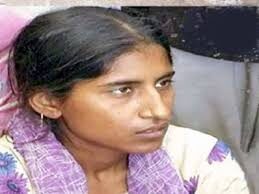Table of Contents
Shabnam Ali (First women of independent India to be hanged)
Who is Shabnam Ali?
Shabnam Ali, who belongs to the Saifi Muslim community, hails from Bawankheri, a village in the outskirts of Amroha. With a double MA in English and Geography, she was a teacher in the village school before being charged for murder of seven of her family members in 2008.
What was happened?
Shabnam’s family was against her relationship with Saleem because of the difference in their socio backgrounds. Her family were well-to-do landlords while Saleem, belonging to the Pathan community, was a daily wager.
Hurt by the family’s reactions, the couple brutally murdered Shabnam’s father Shaukat Ali (55), mother Hashmi (50), elder brother Anees (35), Anees’s wife Anjum (25), younger brother Rashid (22), cousin Rabia (14), and Arsh (10), Anees’s son.
Shabnam and Saleem sedated all the family members, except Arsh. Their heads were chopped off, while Arsh was throttled to death. At this point, Shabnam was seven weeks pregnant with Saleem’s child. In December 2008, she gave birth to her son(taj).
What was Shabnam convicted for?
It was during the course of the trial that the couple turned against each other. Shabnam had claimed that she had informed about her family’s murder. According to her initial version, unknown assailants had barged into her house and killed her family. In 2015, Shabnam in her statement had said that Saleem had entered her house with a knife and killed all her family members, while she was fast asleep. Saleem, on the other hand, confessed to entering the house only upon Shabnam’s request, and that when he had reached there, she confessed to having murdered her family already.
Shabnam and Saleem were sentenced to death by an Amroha sessions court, which was upheld by the Allahabad High Court in 2013, and later the Supreme Court in May 2015. In a span of 10 days, the SC stayed the death warrants. In September 2015, Shabnam’s mercy plea was rejected by the then governor of Uttar Pradesh, Ram Naik. In August 2016, the then President Pranab Mukherjee also rejected her mercy petition.It was in January 2020 that an SC bench led by Chief Justice of India SA Bobde upheld the death sentence.
Although Shabnam has not yet received a death warrant, media reports reveal that preparations are underway at Mathura jail to execute her. As the hanging house for women has not been used since independent India, the structure of the gallows is being fixed, and two hanging ropes have been ordered from Bihar’s Buxar central jail. Shabnam could still seek another judicial review of the petition in SC. She could also file a curative petition,” SC lawyer Sarthak Chaturvedi told the media. “No one can be hanged until all the legal remedies are over.
About Taj-
Shabnam’s son was born in jail and stayed with her until 2015. As women inmates are not permitted to keep children above seven with them, he was sent to foster care. He is being taken care of by journalist Usman Saifi, Shabnam’s junior in college, and his wife Suhina. Usmaan Saifi had told the media in 2015, “The Shabnam you hear of, the woman on death row, is not the Shabnam I know. We went to the same college, She once paid my college fee when I couldn’t, she would help me with my notes and stand up for me in college. So when this happened, I was shocked. I told my wife that I owe a lot to Shabnam and must do this for her.”
Other womens in death row(India)-
There are (12) women on death row in India, according to a 2016 report on the death penalty in India released by National Law University. In the past, the mercy pleas by step-sisters Renuka Shinde and Seema Mohan Gavit were rejected by the President. The sisters were charged with kidnapping/ killing several children in Maharashtra between 1990 and 1996.
Another convict, Ramshri was sentenced to death in 1998, but she gave birth to a child in prison, after which her death warrant was commuted to life imprisonment.
Bibliography-
- Book’s
- Newspaper
About Author:-
Shubhi jaiswar
Second year student of (B.A.LL.B.)
HNBG University Uttrakhand.
Co-author:-
Krishna kumar
First year student B.A(program)
Lucknow University.
Author: Shubhi Jaiswar,
B.A.LL.B. 2nd year/pandit purnanand tiwari law college haridwar uttrakhand

